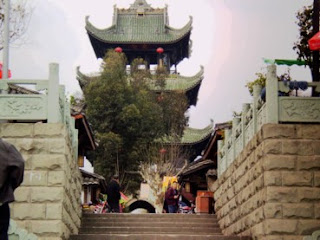It was before 9am when I finished my breakfast of a rare glass of hot milk and a swig of cough syrup when a three-way conversation struck between the girl at the reception desk, a Chinese lady guest, and me. The girls said we should not miss the Peach Festival that was taking place in the hills outside Chengdu. The trip to the hills would take well over an hour with a change of two or three local busses. “Too complicated for me”… I thought.
Before I borrowed the DVD’s and return to bed, the Chinese lady said she had the day to spare and no particular program in mind, could we join together for a trip to the blossoming hills. When she heard my cough she handed me a fresh package of lozenges. What luck… I couldn’t refuse, nor hope for a more perfect companion… She effortlessly led the way, and I can honestly say I would not have made it without her…

Born in Malaysia she spoke Mandarin, Cantonese, English and Malay. When still a child her parents immigrated to Australia, she was married to a tall, handsome Australian, at present both were working and living in Beijing.

Her slightly cynical, good-humored philosophy coincided flawlessly with the brightness of the day. We got along well. Like a couple of school girls we took pictures of each other, pictures of the blossoms, pictures of the hills, of the skyline, the people, the food stalls... and talked as we shared our lunch among the peach blossoms.

I wanted to know the Chinese word for peach, She said it was t’ao. T’ao in China is the symbol of spring, eternal renewal, and longevity. . According to Taoist legend, Hsi Wang Mu, Queen Mother of the West, guards the Peaches of Immortality that grow in her palace garden.

As a gift to newlyweds a peach is a wish for happiness, the written character for T’ao is also that of marriage. The Chinese carve the figures that guard doorways out of peach wood as it is believed T’ao wood can repel evil spirits.

A peach blossom can allude to an early death, and a fallen peach blossom symbolizes a prostitute.

The cheeky mythological King Monkey, was a mortal born with magical powers. After more than 300 years of life, he was at point of death visited by two messengers who carried him off to the underworld. Once there Monkey inspected the Register of the Dead and found his own name: ‘Monkey: Soul number 1,735; 342 years and a fateful death.’ He deleted his name from the Register and returned to life.

On hearing of his daring escape, Yama , god of the underworld, sent Monkey to heaven where he could be supervised. There, mischievous Monkey ascended the heavenly hierarchy from ‘Keeper of the Heavenly Horses’ to Great Sage Equal to Heaven,’ and then to ‘Guardian of the Garden of Heavenly Peaches’ that belonged to the Queen Mother.

When the peaches ripened, once every 6000 years, The Queen Mother held a great feast so the Immortals by eating the fruit could renew their immortality. But Monkey stole and ate all the peaches himself, while drinking from the gourds filled with the elixir of immortality belonging to the philosopher Lao Tzu.
















































